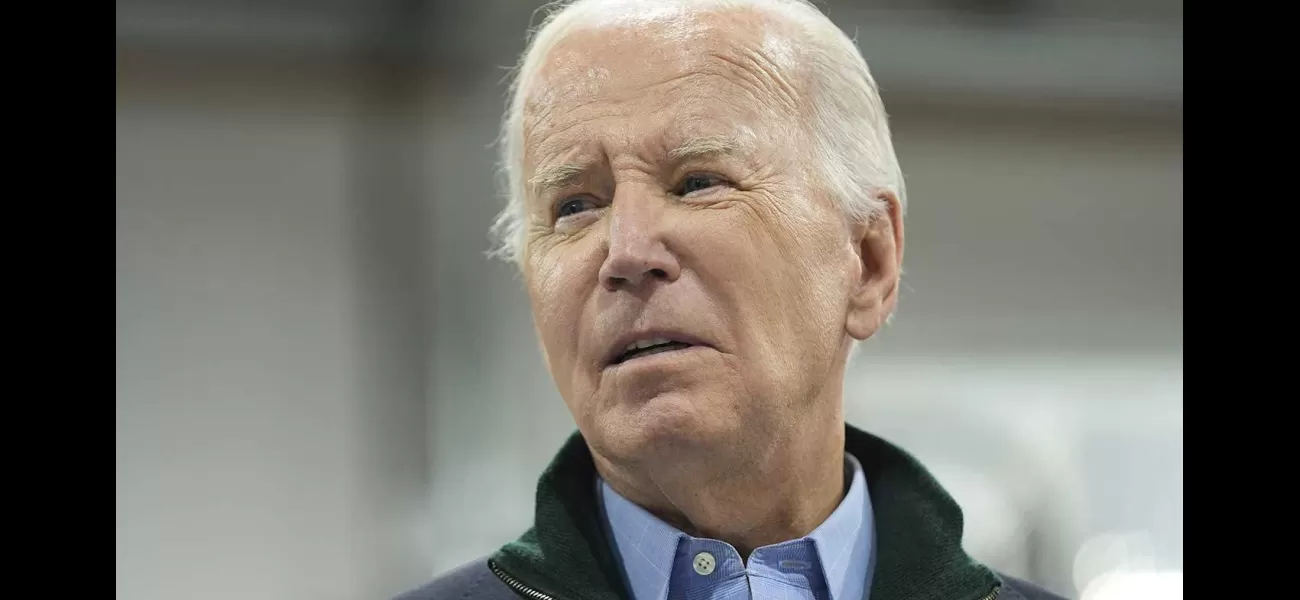US refuses to provide weapons for Israeli attack on Rafah.
Biden won't provide weapons to Israel that could harm civilians in Gaza's Rafah, their last major Hamas stronghold.
May 9th 2024.

In a recent interview with CNN, US President Joe Biden discussed the ongoing conflict between Israel and Hamas in Gaza. He made it clear that while the US remains committed to Israel's defense, they will not supply offensive weapons that could be used to launch a full-scale attack on the city of Rafah. This decision was made in consideration of the more than 1 million civilians who are currently seeking shelter in the city.
Biden clarified that the US will continue to provide defensive weapons, such as Iron Dome rocket interceptors, to Israel. However, they will not supply weapons and artillery shells that have been historically used to target populated areas, like Rafah. This is a significant shift in the US's stance, as they have historically provided large amounts of military aid to Israel.
This change in policy comes after Hamas' attack on October 7th, which resulted in the deaths of 1200 people in Israel and the capture of 250 more. Biden's decision to pause a shipment of heavy bombs to Israel is a clear indication of the growing divide between his administration and Israeli Prime Minister Benjamin Netanyahu's government.
While Biden acknowledged that Israel's actions in Rafah have not yet crossed his red lines, he has emphasized the need for them to do more to protect the lives of civilians in Gaza. The shipment that was put on hold consisted of 1800 900-kilogram bombs and 1700 225-kilogram bombs. The concern from the US was primarily focused on the larger explosives and their potential use in densely populated areas.
Biden expressed his concern for the civilian casualties caused by the bombs and other methods used by Israel to target population centers in Gaza. He stated that the US will not supply weapons that are historically used in these situations. However, he made it clear that this decision does not mean the US is turning its back on Israel's security. Instead, they are reevaluating their support for Israel's ability to wage war in these areas.
Defense Secretary Lloyd Austin also confirmed the weapons delay, stating that the US is reviewing near-term security assistance shipments in light of the events in Rafah. This decision also coincides with the Biden administration's upcoming verdict on whether Israel's actions in Gaza have violated international and US laws designed to protect civilians during war.
The decision to pause the weapons shipment was made last week and was initially kept out of the public eye until the Biden administration had a better understanding of the situation in Rafah. The White House National Security Council wanted to wait until President Biden's speech on Holocaust Remembrance Day before making the decision public.
This pause in military aid was initially considered back in April when it appeared that Israel was moving towards a full-scale invasion of Rafah. However, no final decision has been made on whether the shipment will proceed at a later date. This decision was made without the knowledge of many US officials, including House Speaker Mike Johnson and Senate Republican Leader Mitch McConnell.
The decision to pause the shipment has been met with disappointment and frustration from Israel's ambassador to the United Nations, Gilad Erdan. He believes that political pressure from Congress, campus protests, and the upcoming election may have influenced Biden's decision. Despite this, Biden has reaffirmed the US's commitment to Israel's defense, even when they may disagree on certain issues.
In a recent interview with CNN, US President Joe Biden expressed his concerns about the ongoing conflict between Israel and Hamas in Gaza. He stated that while the US remains committed to Israel's defense, they will not provide offensive weapons that could potentially harm innocent civilians. Biden specifically mentioned the city of Rafah, which is currently the last major stronghold for Hamas in Gaza and is home to over a million civilians.
Biden clarified that the US will continue to supply Israel with defensive weapons such as Iron Dome rocket interceptors, but they will not provide any weapons or artillery shells that could be used in a potential assault on Rafah. This decision comes in the wake of Hamas' attack on October 7, which resulted in the deaths of 1200 people in Israel and the capture of 250 individuals by militants. The growing tension between the Biden administration and Israel's Prime Minister Benjamin Netanyahu's government has become more evident, with Biden's comments and his recent decision to pause a shipment of heavy bombs to Israel.
The shipment in question was supposed to include 1800 900-kilogram bombs and 1700 225-kilogram bombs, according to a senior US administration official. The concern was primarily focused on the larger explosives and their potential use in a densely populated area. Biden stated that civilians in Gaza have already been killed by these types of bombs, and he does not want to contribute to any further harm. He emphasized that the US is not turning its back on Israel's security, but rather, they are not willing to support their ability to wage war in areas where civilians may be at risk.
US Defence Secretary Lloyd Austin also confirmed the weapons delay, stating that the US is pausing "one shipment of high payload munitions." He reassured that the US will continue to ensure that Israel has the necessary means to defend itself, but they are currently reviewing the situation in Rafah before proceeding with any further assistance. The decision to pause the shipment was made last week, and a final decision has not been made yet.
This pause in military aid comes as the Biden administration prepares to deliver a verdict on whether Israel's airstrikes on Gaza and restrictions on aid delivery have violated international and US laws. A decision against Israel would increase pressure on Biden to limit the flow of weapons and money to Israel's military. The decision to pause the shipment was conveyed to the Pentagon last week, but the White House National Security Council chose to keep it under wraps until they had a better understanding of the situation in Rafah.
Biden's administration began reviewing future transfers of military assistance in April, as Netanyahu's government appeared to be moving towards an invasion of Rafah despite opposition from the White House. The official stated that no final decision has been made on whether to proceed with the shipment at a later date. The US officials initially declined to comment on the pause, but the news eventually came out as Biden reaffirmed the US's support for Israel during his speech on Holocaust Remembrance Day.
Israel's ambassador to the United Nations, Gilad Erdan, expressed his disappointment in the decision to pause the shipment, suggesting that it may have been influenced by political pressure. The move has also received criticism from House Speaker Mike Johnson and Senate Republican Leader Mitch McConnell, who were not informed of the holdup despite assurances from the Biden administration that no such action was being taken.
Biden clarified that the US will continue to provide defensive weapons, such as Iron Dome rocket interceptors, to Israel. However, they will not supply weapons and artillery shells that have been historically used to target populated areas, like Rafah. This is a significant shift in the US's stance, as they have historically provided large amounts of military aid to Israel.
This change in policy comes after Hamas' attack on October 7th, which resulted in the deaths of 1200 people in Israel and the capture of 250 more. Biden's decision to pause a shipment of heavy bombs to Israel is a clear indication of the growing divide between his administration and Israeli Prime Minister Benjamin Netanyahu's government.
While Biden acknowledged that Israel's actions in Rafah have not yet crossed his red lines, he has emphasized the need for them to do more to protect the lives of civilians in Gaza. The shipment that was put on hold consisted of 1800 900-kilogram bombs and 1700 225-kilogram bombs. The concern from the US was primarily focused on the larger explosives and their potential use in densely populated areas.
Biden expressed his concern for the civilian casualties caused by the bombs and other methods used by Israel to target population centers in Gaza. He stated that the US will not supply weapons that are historically used in these situations. However, he made it clear that this decision does not mean the US is turning its back on Israel's security. Instead, they are reevaluating their support for Israel's ability to wage war in these areas.
Defense Secretary Lloyd Austin also confirmed the weapons delay, stating that the US is reviewing near-term security assistance shipments in light of the events in Rafah. This decision also coincides with the Biden administration's upcoming verdict on whether Israel's actions in Gaza have violated international and US laws designed to protect civilians during war.
The decision to pause the weapons shipment was made last week and was initially kept out of the public eye until the Biden administration had a better understanding of the situation in Rafah. The White House National Security Council wanted to wait until President Biden's speech on Holocaust Remembrance Day before making the decision public.
This pause in military aid was initially considered back in April when it appeared that Israel was moving towards a full-scale invasion of Rafah. However, no final decision has been made on whether the shipment will proceed at a later date. This decision was made without the knowledge of many US officials, including House Speaker Mike Johnson and Senate Republican Leader Mitch McConnell.
The decision to pause the shipment has been met with disappointment and frustration from Israel's ambassador to the United Nations, Gilad Erdan. He believes that political pressure from Congress, campus protests, and the upcoming election may have influenced Biden's decision. Despite this, Biden has reaffirmed the US's commitment to Israel's defense, even when they may disagree on certain issues.
In a recent interview with CNN, US President Joe Biden expressed his concerns about the ongoing conflict between Israel and Hamas in Gaza. He stated that while the US remains committed to Israel's defense, they will not provide offensive weapons that could potentially harm innocent civilians. Biden specifically mentioned the city of Rafah, which is currently the last major stronghold for Hamas in Gaza and is home to over a million civilians.
Biden clarified that the US will continue to supply Israel with defensive weapons such as Iron Dome rocket interceptors, but they will not provide any weapons or artillery shells that could be used in a potential assault on Rafah. This decision comes in the wake of Hamas' attack on October 7, which resulted in the deaths of 1200 people in Israel and the capture of 250 individuals by militants. The growing tension between the Biden administration and Israel's Prime Minister Benjamin Netanyahu's government has become more evident, with Biden's comments and his recent decision to pause a shipment of heavy bombs to Israel.
The shipment in question was supposed to include 1800 900-kilogram bombs and 1700 225-kilogram bombs, according to a senior US administration official. The concern was primarily focused on the larger explosives and their potential use in a densely populated area. Biden stated that civilians in Gaza have already been killed by these types of bombs, and he does not want to contribute to any further harm. He emphasized that the US is not turning its back on Israel's security, but rather, they are not willing to support their ability to wage war in areas where civilians may be at risk.
US Defence Secretary Lloyd Austin also confirmed the weapons delay, stating that the US is pausing "one shipment of high payload munitions." He reassured that the US will continue to ensure that Israel has the necessary means to defend itself, but they are currently reviewing the situation in Rafah before proceeding with any further assistance. The decision to pause the shipment was made last week, and a final decision has not been made yet.
This pause in military aid comes as the Biden administration prepares to deliver a verdict on whether Israel's airstrikes on Gaza and restrictions on aid delivery have violated international and US laws. A decision against Israel would increase pressure on Biden to limit the flow of weapons and money to Israel's military. The decision to pause the shipment was conveyed to the Pentagon last week, but the White House National Security Council chose to keep it under wraps until they had a better understanding of the situation in Rafah.
Biden's administration began reviewing future transfers of military assistance in April, as Netanyahu's government appeared to be moving towards an invasion of Rafah despite opposition from the White House. The official stated that no final decision has been made on whether to proceed with the shipment at a later date. The US officials initially declined to comment on the pause, but the news eventually came out as Biden reaffirmed the US's support for Israel during his speech on Holocaust Remembrance Day.
Israel's ambassador to the United Nations, Gilad Erdan, expressed his disappointment in the decision to pause the shipment, suggesting that it may have been influenced by political pressure. The move has also received criticism from House Speaker Mike Johnson and Senate Republican Leader Mitch McConnell, who were not informed of the holdup despite assurances from the Biden administration that no such action was being taken.
[This article has been trending online recently and has been generated with AI. Your feed is customized.]
[Generative AI is experimental.]
0
0
Submit Comment





